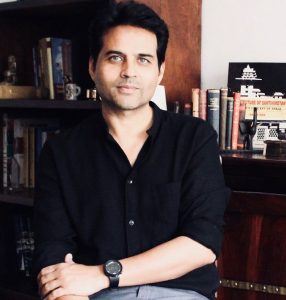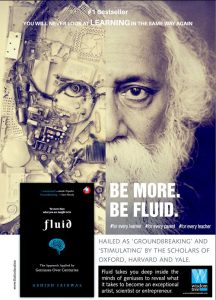In our Author Speak series, we bring you Ashish Jaiswal – the author of Fluid, a book about Education – a subject that we usually leave to the experts.

Author Ashish Jaiswal Interview
1. Tell us about your growing up – where were you born, what did you study and what kind of books you read.
Ashish Jaiswal: I was born and brought up in Bhopal, one of the most blissful towns in India. I have a master’s and a doctorate in Education from the University of Oxford and work in improving our educational journeys. However, I have always tried to dabble outside my curriculum. Hence, my self-cooked and ever-evolving curriculum include books from Plato to J. Krishnamurthi to vernacular literature and of course not to miss murder mysteries, science fiction, and breezy reads.
2. What made you write Fluid? Share the stories that made you think about the direction of the book.
Ashish Jaiswal: There are very many people who talk a lot about what all is wrong with our education but a few speak with data sets and ‘how to’ directional sense. Faltering and changing course (discipline, field or job) remain a big taboo in our learning journey. Fluid is for all the dreamers and rebels who refuse to box their thinking but may find it hard to satisfy their peers, parents or society.
3. Education as we know today is a product of Industrial Era’s need for creating an army of clerks. It somewhere got disconnected from learning as it used to be in the ancient times, Do you think we need to go back to learning rather than just educating ourselves for employment?
Ashish Jaiswal: It will be quite a sweeping statement to say that current education ecosystem is only meant to create an army of clerks. If we look beyond the debate of ancient vs. modern system, we can divide the purpose of education into ‘vocational’ (short term, surficial and extremely livelihood centric) and ‘pursuing knowledge’ (long-term, deep and capability drove). People often do not believe, as it sounds counter-intuitive, that ‘pursuing knowledge’ may eventually end up giving them better placement opportunities.
 4. We are living in the age of analysis, maybe over analysis. Do you think we need to bring back the age of synthesis where people are well versed with multiple disciplines?
4. We are living in the age of analysis, maybe over analysis. Do you think we need to bring back the age of synthesis where people are well versed with multiple disciplines?
Ashish Jaiswal: I think the concept of ‘holism’ remains quite under-stated in our educational journeys. In general sense, a specialist has to keep narrowing in order to become a better specialist. The narrowness in the name of specialization develops a false notion in the minds of educated ones that a specialist is not supposed to extend beyond his or her discipline or field. Many times, this flawed understanding prevents us from achieving path-breaking results or on a deeper level even enjoying life to its fullest.
5. Have you studied the ancient Indian education systems like Gurukuls and Ghatikas? If Yes, what is your view on them?
Ashish Jaiswal: Yes, I have. I do believe that these systems were organized around sophisticated pedagogical and curricular strategy. However, access to limited population and lack of institutionalization were two of the key limitations of these systems, which eventually deteriorated the scientific pursuit and made them crumble.
6. In a Specialist Vs Generalist Debate, which side would you choose and why?
Ashish Jaiswal: I am sorry but I think that this is a wrong way of segregating and the labels are self-defeating. There can’t be any dispute that we all should endeavor to become specialist, the careful add-on question here is: whether a specialist is narrower or wider in his or her observation of the world and absorption of knowledge.
7. How did you approach studying the lives of exceptionally creative and successful people for your book?
Ashish Jaiswal: I kept a double helix approach – one strand was identifying key approaches and attributes of these great minds and the second strand was weaving a common thread across all the great minds. Soon, the data set started revealing ‘fluid thinking’ as a common feature across many such great minds.
8. Tell us the 3 key takeaways that readers can expect from Fluid?
Ashish Jaiswal: One of the key takeaways is the idea of ‘fluid-specialist’ in the current era of artificial intelligence – how does one remain fluid yet at the same time emerge as a specialist in a particular field. I have tried my level best to keep the journeys of these great minds as original and as interesting as possible. For example, I take readers through the design journey of iPhone – how Steve Jobs arrived at conceptualizing iPhone. In order to do this, I take the readers back in the year 1837, this connection is an absolute original piece, which one may not find in the public domain. Finally, demolishing myths surrounding the idea of who ultimately is an artist, scientist or an entrepreneur, can be one of the crucial most takeaways from the fluid.
9. What is your writing routine? Do you follow any rituals?
Ashish Jaiswal: I don’t have a writing routine except that I walk a lot when I write. I record my thoughts as I walk and eventually transcribe. Do put a Diya inside my study and an Agarbatti inside a flower pot placed next to its entry door.
10. Tell us about the next book you are working on.
Ashish Jaiswal: Very soon.
More about Fluid by Ashish Jaiswal
 Fluid – the approach applied by geniuses over centuries is an upcoming book, aimed for a universal reader, by Ashish who is also an Associate Fellow at Oxford Centre for Higher Education Policy Studies (OXCHEPS). Fluid, a result of 3 years of research introduces the theory of ‘fluid thinking’ by drawing a pattern from the approaches applied by great minds across fields and presents a methodology which can take us on the path of world-class innovations, ground-breaking solutions, innovative ideas, and billion-dollar start-ups.
Fluid – the approach applied by geniuses over centuries is an upcoming book, aimed for a universal reader, by Ashish who is also an Associate Fellow at Oxford Centre for Higher Education Policy Studies (OXCHEPS). Fluid, a result of 3 years of research introduces the theory of ‘fluid thinking’ by drawing a pattern from the approaches applied by great minds across fields and presents a methodology which can take us on the path of world-class innovations, ground-breaking solutions, innovative ideas, and billion-dollar start-ups.
Buy Fluid by Ashish Jaisawal at Amazon
Fluid shatters the myth of narrow specialization and stimulates a fundamental shift in the approach people usually take to become experts. Fluid can be highly beneficial for anyone wanting to stay relevant in the era of artificial intelligence and the changing future.
The Fluid highlights the importance of failure, remaining uncertain and not committing to a fixed discipline by drawing from the lives of geniuses such as Leonardo Da Vinci, C.V. Raman, H.G. Wells, Steve Jobs, Charles Darwin, Amartya Sen, and others. Ashish Jaiswal has been fondly considered as the next ‘Indian’ Malcolm Gladwell by his peers and his book has been greatly appreciated by stalwarts like Sam Pitroda, Amish Tripathi among others.








